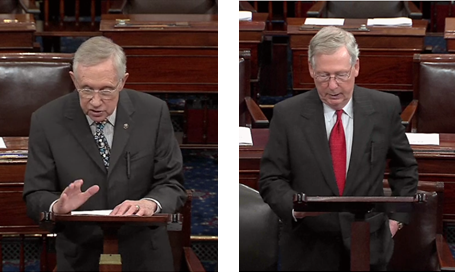 |
| Senators Harry Reid and Mitch McConnell comment on the budget extension (NY Times). |
The extension gives Congress more time to work out the details for next year's federal budget plan, with special attention given towards preventing the nation from hitting its debt ceiling. Budget talks are expected to proceed immediately so that an appropriations bill an be settled before December 11. The main conflict is between Democrats, who want federal spending to focus more on domestic programs, and Republicans, who want an increase in military spending. If Congress and the President cannot come to an agreement, it is very likely that another continuing resolution will be passed then, which does not bode well for the nation's debt.
Boehner has stated that he hopes to be able to "clean the barn up a little bit" for his successor. However, his plans seems unlikely because of his limited time in October (the House is only in session for 13 days). Since the next Speaker is likely to be even less agreeable, his resignation only adds more problems. His resignation has sparked in-party fighting with the Republicans, which is taking their focus away from dealing with national issues.
It seems to me that recently there has been an increase in hostage taking, especially with Republicans. That being said, what do you believe will be the consequences of their inability to compromise and efficiently pass legislation? Accordingly, what do you think are the chances of Congress being able to pass a bipartisan budget by December 11?
Links:
CNN
NY Times
Washington Post
USA Today
1 comment:
I think that Boehner's resignation is extremely ill-timed and will further complicate an already extremely contentious issue. The debate about federal budget has been one of the core differences in political parties since the inception of the United States, and it has only worsened with the increasing toxicity and underhanded tactics used by both parties in Congress. Ultimately, because of all the turmoil that is sure to come with the Republican inter-party conflict and the election of a new Speaker of the House, it's doubtful at best that a compromise can be passed on the federal budget by the deadline December. For the nation's good, I hope to be proven wrong.
Post a Comment